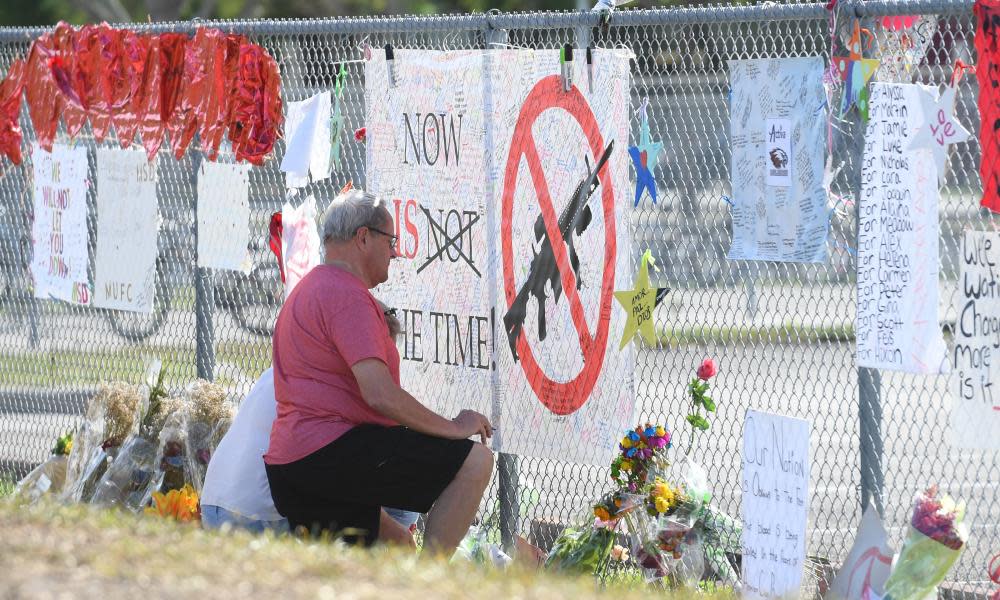Republicans eye compromise on guns – but most resist assault weapons ban

In the aftermath of the Parkland shooting, as American high school students stage walkouts to protest lawmakers’ lack of action on gun control, some Republicans are beginning to offer concessions. But most are still resisting the major demand from young advocates: a renewed ban on assault weapons.
On Friday, Donald Trump repeated his preferred responses to Parkland: new emphasis on background checks and arming teachers to create “offensive capability” in schools.
But Brian Mast, a Republican representing a closely contested swing district in Florida, broke with his party, announcing in a newspaper column that he believed AR-15 rifles and other military style weapons should be banned.
Mast, an army veteran who lost both legs in Afghanistan and was awarded the Purple Heart, cited his military experience.
“My rifle in the army was very similar to the AR-15-style semiautomatic weapon used to kill at Marjory Stoneman Douglas High School in Parkland,” Mast wrote. “I cannot support the primary weapon I used to defend our people being used to kill children I swore to defend.”
Seventeen people were killed in Parkland.
Mast, who said he regularly carried a concealed handgun, wrote in the New York Times that the availability of tactical rifles made it less likely he would be able to defend himself or others with his handgun.
His congressional district is one Democrats hope to flip in the November midterms. Outside money has been pouring into the race from donors to both parties, a sign of the district’s importance to the larger fight for the House of Representatives, the Treasure Coast Palm reported.
Mast wrote that he did not support confiscating weapons Americans had already purchased but would support a ban on future purchases of certain weapons. More discussion was needed to determine how to define “assault weapon”, he wrote, and what firearms besides guns modeled on the AR-15 should be banned.
The 1994 federal assault weapon ban, which expired in 2004, defined a list of banned guns according to certain military-style features, a choice gun rights advocates have long criticized as too focused on cosmetics.
The way “assault weapon” was defined under the law allowed manufacturers to make small tweaks to existing weapons and continue to sell them.
A justice department-funded evaluation of the ban concluded there was no clear evidence it had contributed to an overall reduction in violence, and suggested that the impact of a renewed ban would be “small at best and perhaps too small for reliable measurement”.
Rifles of any kind are used in only about 3.6% of all gun murders, according to the best available data from the FBI. Handguns are used in the majority of gun murders in the US.
But as military-style guns have become the weapon of choice for mass shootings, public outrage has created a new push to renew the ban.
Many Republicans appear to be hoping that more moderate compromises may be enough. For a party that has blocked any substantive gun control legislation since the 2012 Sandy Hook elementary school shooting, in which 20 young children and six adults were killed, the support of any gun control measures at all marks a significant shift.
The Florida governor, Rick Scott, a gun rights advocate, said on Friday he would endorse raising the legal age to buy a rifle to 21. The Florida gunman, who was 19, was able to legally buy a military style rifle before he could buy a beer.
Earlier in the week, a National Rifle Association spokeswoman told the Hill the group did not support raising the legal age to buy a rifle.
Scott also endorsed a law creating gun violence restraining orders, which would give families and law enforcement officials a way to petition a court to temporarily block an unstable person from buying or owning guns.
That is a policy with strong support from both researchers and gun violence prevention groups. Scott also said Florida needed to tighten domestic violence gun laws and ban bump stocks.
Scott’s limited concessions mirrored the compromises the Florida senator Marco Rubio offered in a televised town hall with Parkland shooting survivors on Wednesday night.
Rubio also said he would consider supporting a ban on high-capacity ammunition magazines, which experts call the most functionally important part of the 1994 ban.
Parents and student survivors of the massacre at Marjory Stoneman Douglas high school made it clear they wanted a full assault weapon ban, a demand that received repeated cheers and standing ovations on Wednesday.

 Yahoo News
Yahoo News 
